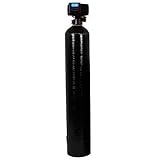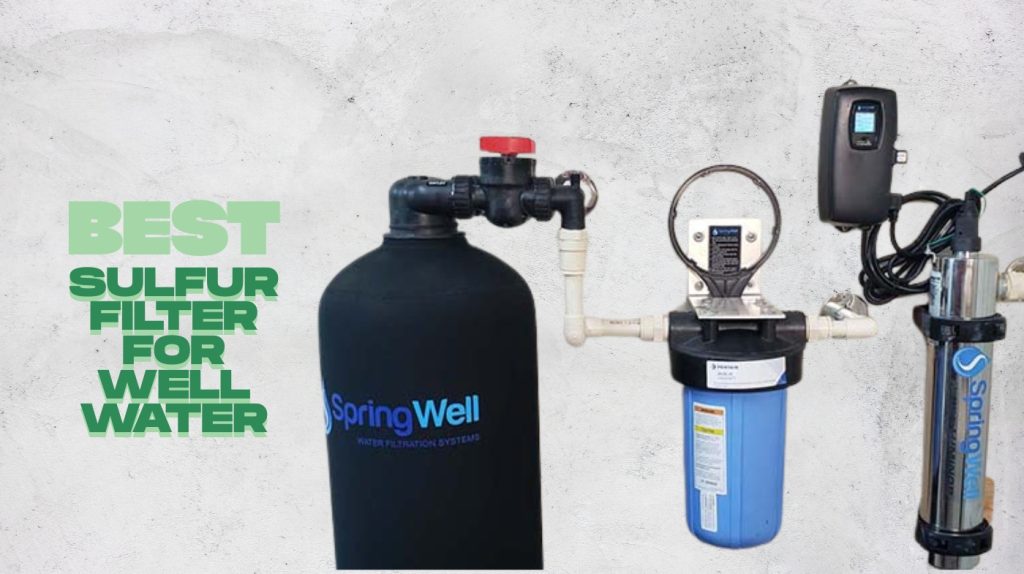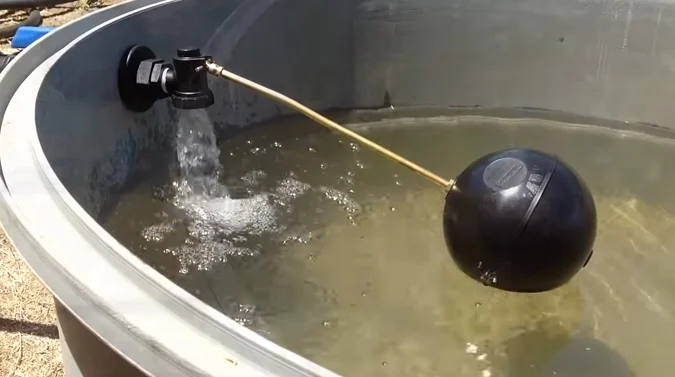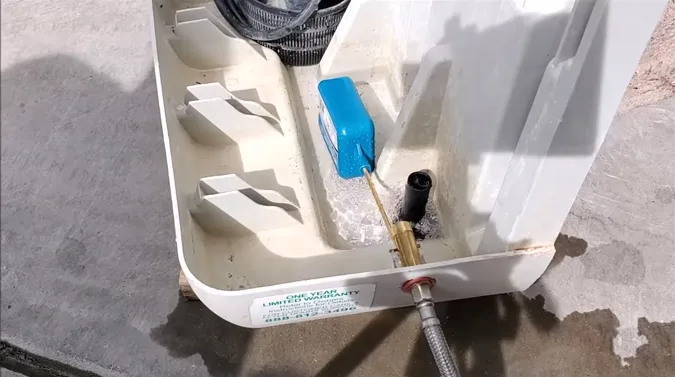Last Updated on November 25, 2025
If you want to remove sulfur odors and improve your well water’s taste, consider the Fleck 5600 SXT Air Injection Iron Eater for powerful sulfur, iron, and manganese removal, or the Deluxe Well Water Filter System for eco-friendly, no-fuss odor and sediment control.
The Waterdrop Whole House System also offers multi-stage filtration and easy DIY setup. Each balances capacity, maintenance, and cost so you get clean water without hassle. Continue exploring to find the option that best fits your needs.
| Image | Name | Editor's Rating | Price |
|---|---|---|---|

|
DuraWater Fleck 5600 SXT Air Injection I...
|
|
|

|
The Sulfur Eliminator Deluxe Well Water ...
|
|
|

|
Waterdrop Whole House Water Filter Syste...
|
|
Key Takeaways
- Fleck 5600 SXT effectively removes sulfur odors, iron up to 12 ppm, and manganese, with no batteries and DIY-friendly installation.
- Deluxe Well Water Filter offers eco-friendly, maintenance-free sulfur and iron removal via venturi technology with quick, tool-free setup.
- Waterdrop WD-WHF21-FG features a 5-stage filtration reducing up to 99.3% iron and 96.8% manganese, with easy DIY installation.
- Choose filters matching sulfur and iron levels to ensure optimal odor removal and long-lasting performance.
- Regular maintenance and timely filter replacements sustain water quality and prevent system clogging or failure.
Fleck 5600 SXT Air Injection Iron Eater Filter (1.5 cubic ft)
- Fleck Black Series Fleck 5600 SXT Digital air injection system
- 1.5 Cubic Ft of Upgraded Centaur Catalytic Carbon
- Remove iron up to 12 ppm, Sulfur up to 10 ppm, Manganese up to 2 ppm
If you’re dealing with high levels of iron, manganese, or sulfur in your well water, the Fleck 5600 SXT Air Injection Iron Eater Filter (1.5 cubic ft) offers a powerful, all-in-one solution that’s designed for effective removal of these contaminants up to 12 ppm iron, 2 ppm manganese, and 10 ppm sulfur (H2S).
It uses upgraded Centaur catalytic carbon and air injection to create super oxidation pockets, ensuring prime filtration. You can install it yourself with basic plumbing skills, and it runs without batteries. This durable, 65-pound system delivers cleaner, odor-free water while reducing stains and improving taste for up to five years.
Best For: Homeowners with private wells who need an effective, low-maintenance solution to remove high levels of iron, manganese, and sulfur from their water supply.
Pros:
- Effectively removes iron up to 12 ppm, manganese up to 2 ppm, and sulfur (H2S) up to 10 ppm using advanced catalytic carbon and air injection technology.
- DIY-friendly installation with no batteries required and minimal maintenance compared to traditional softeners.
- Provides clean, odor-free water that reduces staining and improves taste for up to five years.
Cons:
- Regeneration frequency may need fine-tuning to avoid septic system drain field overload.
Deluxe Well Water Filter System for Removing Rotten Egg Smell, Iron & Sediments
- REMOVE ROTTEN EGG SMELL: Say goodbye to sulfur odors with The Sulfur Eliminator, which is designed...
- EASY 5-MINUTE INSTALL: No tools or expertise required! If you can screw on a garden hose, you can...
- MAINTENANCE-FREE SYSTEM: Once installed, enjoy continuous performance without the need for ongoing...
Homeowners dealing with stubborn rotten egg smells, iron stains, and sediment buildup will find the Deluxe Well Water Filter System an ideal solution. It uses patented venturi technology to naturally aerate and filter your well water without electricity or chemicals.
Installation is quick and tool-free—just screw it onto your well spigot. This rust-resistant, multi-stage filter removes sulfur odors, iron, rust, and sediment effectively. Users say odor elimination within hours and long-lasting results.
Plus, annual filter replacements keep it running smoothly. You’ll enjoy cleaner, fresher water with an eco-friendly, maintenance-free system.
Best For: Homeowners with well water experiencing sulfur odors, iron stains, and sediment buildup seeking an easy-to-install, chemical-free filtration system.
Pros:
- Quick, tool-free installation with no electricity or harsh chemicals required.
- Effectively removes sulfur smell, iron, rust, and sediment using patented venturi technology.
- Eco-friendly, maintenance-free design with annual filter replacement.
Cons:
- May not be suitable for wells smaller than 4 inches in diameter.
Waterdrop Whole House Water Filter System (WD-WHF21-FG)
- 【Efficient filtration】The combination of iron and manganese reducing filter and GAC filter...
- 【Longer lifespan】The iron and manganese reducing filter and GAC filter will serve for up to six...
- 【Strong and durable】The home water filtration system has passed 100,000+ water hammer tests and...
When you need a reliable solution to tackle sulfur, iron, and manganese in well water, the Waterdrop Whole House Water Filter System (WD-WHF21-FG) stands out for its all-inclusive 5-stage filtration.
It combines iron and manganese reducing filters with granular activated carbon made from natural coconut shells, effectively removing up to 99.3% iron and 96.8% manganese, along with chlorine, rust, and odors. You’ll enjoy cleaner, better-tasting water throughout your home.
Installation is DIY-friendly, supported by included tools and clear instructions. With filters lasting about six months and affordable replacements, this durable system offers consistent performance and improved water quality.
Best For: Homeowners with well water seeking an effective, easy-to-install filtration system that reduces iron, manganese, chlorine, and odors throughout the entire house.
Pros:
- Comprehensive 5-stage filtration effectively removes up to 99.3% iron and 96.8% manganese, improving water taste and quality.
- DIY-friendly installation with included tools and clear instructions, plus durable build tested for pressure and water hammer.
- Filters last about six months with affordable replacements, supporting cost-effective maintenance and consistent performance.
Cons:
- May require adapters for certain plumbing configurations due to standard 1-inch inlet/outlet size.
Best Well Water Sulfur Filters – Comparison Table
| Feature | Fleck 5600 SXT Air Injection Iron Eater | Deluxe Well Water Filter System | Waterdrop Whole House System (WD-WHF21-FG) |
|---|---|---|---|
| Best For | High levels of iron, sulfur & manganese in private wells | Rotten egg smell, iron stains & sediment removal | Whole-house filtration of iron, manganese, and odors |
| Filtration Type | Air injection + Centaur catalytic carbon | Patented venturi aeration technology | 5-stage system with carbon & sediment filters |
| Sulfur Removal | Up to 10 ppm | Effectively removes rotten egg odor | Removes odors, including sulfur smell |
| Iron Removal | Up to 12 ppm | Removes iron & rust | Reduces up to 99.3% of iron |
| Manganese Removal | Up to 2 ppm | Not specified | Reduces up to 96.8% of manganese |
| Installation | DIY-friendly, no batteries needed | Tool-free, under 5 minutes | DIY setup with tools and instructions included |
| Maintenance | Minimal, lasts up to 5 years | Maintenance-free, annual filter replacement | Filter change every 6 months, affordable replacements |
| Eco-Friendliness | Runs without electricity | No chemicals or electricity needed | Uses natural coconut shell carbon |
| System Weight | 65 lbs, durable design | Lightweight, rust-resistant build | Strong design, tested for 100,000+ water hammer impacts |
Sulfur Filter Buying Guide: What to Look for in Well Water Solutions?
When choosing a sulfur filter for your well water, you’ll want to consider:
Filtration Capacity Needs
Choosing the right sulfur filter for your well water starts with understanding the level of sulfur contamination, measured in parts per million (ppm). You’ll want a filter that effectively removes sulfur up to at least 10 ppm for moderate contamination or higher if your water has severe sulfur levels.
Match the filter’s capacity—often indicated in cubic feet or specific ppm removal—to your household’s daily water usage to ensure enough treatment without overworking the system.
Also, check if the filter’s lifespan and regeneration requirements fit your long-term needs, especially if sulfur levels are high. By carefully considering these filtration capacity factors, you’ll maintain clean, odor-free water that suits your home’s consumption patterns efficiently.
Regeneration Frequency Options
Although sulfur filters come with default regeneration cycles, you’ll want to adjust the frequency based on your water’s sulfur and iron levels as well as your daily usage. Higher contaminant levels mean you’ll need more frequent regenerations to keep your water clean.
Many systems default to daily cycles lasting about 15 minutes, but you can customize these settings to avoid wasting water and salt. If you live in a septic or environmentally sensitive area, optimizing regeneration schedules is essential to prevent overloading your drain field with excess minerals.
Regularly monitoring water quality and filter performance helps you decide whether to shorten or extend regeneration intervals. Choosing a sulfur filter with customizable regeneration options lets you tailor maintenance for better efficiency and cost savings.
Installation Complexity Level
Since installation complexity varies widely among sulfur filters, you’ll want to assess your comfort level with plumbing tasks before selecting a system. Some filters, like venturi or cartridge-based models, can be set up quickly with minimal tools, making them ideal if you prefer a DIY approach.
Others, especially multi-stage systems with integrated control valves, demand more extensive plumbing work and careful configuration, often requiring professional help. Systems relying solely on water pressure without electrical components tend to be simpler to install.
You should also verify the compatibility of the filter’s inlet and outlet connections with your existing plumbing. Understanding these factors helps you choose a sulfur filter that fits your skills and avoids installation headaches.
Maintenance Requirements Overview
When you pick a sulfur filter for your well water, understanding its maintenance needs is key to keeping it effective. Some filters require minimal upkeep, using natural water pressure and self-cleaning features to reduce how often you intervene.
Others need regular maintenance, like annual filter replacements or system flushing, to maintain ideal sulfur removal. The lifespan of filter media varies widely from six months to five years—depending on your water quality and usage. If
you neglect maintenance, you risk clogged filters, lower flow rates, and poor sulfur elimination. Make sure you follow proper maintenance schedules and clear replacement instructions to prevent system failure and keep your water quality consistently high.
Compatibility With Septic
Choosing a sulfur filter that works well with your septic system is essential to avoid damage and costly repairs. You should pick filters labeled septic-safe, ensuring they won’t introduce harmful chemicals that disrupt beneficial bacteria.
Make sure the filter’s size and rating match your system’s needs to prevent clogging or overloading the drain field. Regular maintenance and timely regeneration keep waste buildup in check, preserving your septic system’s balance.
Using a properly designed sulfur filter helps remove sulfur odors effectively without compromising septic performance. By selecting a septic-compatible filter and following recommended upkeep, you’ll protect your drain field, avoid septic failure, and maintain clean, odor-free well water.
Long-Term Cost Considerations
Protecting your septic system goes hand in hand with managing the long-term costs of your sulfur filter. You’ll want to contemplate how often you need to replace filter media, like the annual changes required for Iron Buster filters, to plan ongoing expenses accurately.
Also, evaluate the durability and lifespan of your system’s components to anticipate maintenance costs. Don’t forget the price of replacement parts, such as activated carbon or sediment filters, which may need swapping every few months to years.
While higher upfront costs for more durable or efficient filters might seem steep, they often save you money over time by reducing replacements and repairs. Plus, you could cut costs further by lowering chemical treatments or water softening needs throughout your filter’s lifespan.
Frequently Asked Questions
How Often Should Sulfur Filters Be Professionally Serviced?
Oh sure, just ignore your sulfur filter and hope it magically fixes itself! In reality, you should have your sulfur filter professionally serviced every 6 to 12 months. Regular maintenance guarantees it removes that nasty odor and taste effectively.
Waiting too long risks clogs and reduced efficiency. So, don’t skip those check-ups—you’ll keep your water fresh and avoid costly repairs down the line. You’ve got this!
Can Sulfur Filters Remove Bacteria From Well Water?
Sulfur filters alone usually can’t remove bacteria from your well water. They’re designed to target hydrogen sulfide gas, which causes that rotten egg smell. If you want to tackle bacteria, you’ll need an additional treatment like UV purification or chlorination.
So, don’t rely solely on sulfur filters for bacteria removal—consider combining them with proper disinfection methods to keep your water safe and clean.
Are Sulfur Filters Safe for All Plumbing Systems?
You’ll find that sulfur filters are generally safe for most plumbing systems, but it’s important to check compatibility. Some filters use media that can cause sediment buildup or affect certain pipe materials over time.
Make sure you consult your plumber or the filter manufacturer to confirm your system can handle the filter without damage. Regular maintenance is key to keeping everything running smoothly and preventing potential issues.
What Is the Average Lifespan of a Sulfur Filter Media?
You’ll find that the average lifespan of sulfur filter media typically ranges between 5 to 7 years, depending on your water quality and usage. If your well water has high sulfur content, the media might wear out faster.
Regular maintenance and backwashing help extend its life. Keep an eye on any return of that rotten egg smell—it’s a sign you’ll need to replace or recharge the media soon to keep your water fresh.
Do Sulfur Filters Require Electricity to Operate?
You don’t always need electricity for sulfur filters to work. Many sulfur filters, especially those using natural oxidation media like manganese greensand or catalytic carbon, operate purely through water flow and chemical reactions.
However, some advanced systems, like those with air injection or backwashing features, may use electricity to power pumps or control valves. So, whether your filter needs power depends on its design and technology.
Unlocking Clean Water: The Right Filter Makes All the Difference
Choosing the right sulfur filter for your well water is like picking the perfect key to unseal fresh, clean water. Just as a key fits only one lock, the ideal filter matches your specific needs, whether it’s tackling that stubborn rotten egg smell or clearing iron and sediments.
By selecting wisely, you’ll open the door to pure, great-tasting water every time, turning your well into a source of refreshment, not frustration.
Last update on 2026-03-01 / Affiliate links / Images from Amazon Product Advertising API






